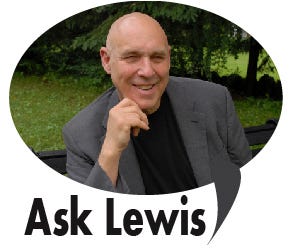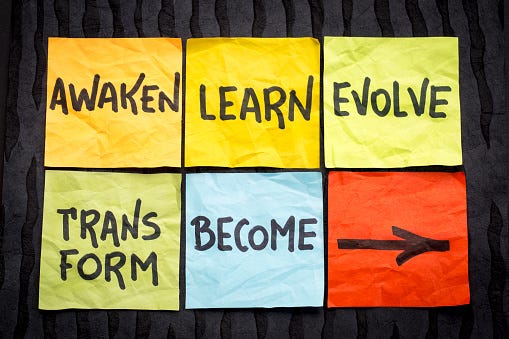Mindfulness and the Best Tips from Transmodern Zen
An ancient path reframed for Generation Z
“This newsletter serves a demographic of highly intelligent readers, deep thinkers, life hackers, preppers, entrepreneurs, and survivalists. I especially focus on those with a passion for ideas, critical thinking, strategic game theory, and a desire to understand the world around them. Readers of my posts are usually tired of being patronized elsewhere by fact-less, opinionated know-nothings, misinformation, conspiracy theories, and fake news.
“Knowledge is power, wisdom brings meaning, contentment, and happiness!”
The Life Strategies Playbook & Mentoring Program is a reader-supported publication. To receive new posts and support my work, consider becoming a free or paid subscriber.
Subscribe!
———————————————————
———————————————————
On a personal note: Please excuse grammatical errors, typos, repetition, and any general nonsense, and such in this post. I am getting a bit older now, and I have about 20,000 pages of information that must get published before I leave the mortal coil. I simply write and publish more than my humble editors are able to correct. If you find enough errors you are welcome to contact me about being an editor of my work.
Thanks for sharing this newsletter with your friends and associates -
Join us for daily tips on personal development at our free Self-Improvement for Beginners Community and Forum
Click Below or cut and paste the URL to Join
https://www.facebook.com/groups/455029215769173
———————————————————
A 3 - Minute Read
Mindfulness: A Poem
Let’s all take a leap,
To a life of mindfulness meditation sleep,
Here there is no worry or weep,
Only a richness and happiness heap
Here subconscious has no regret,
And a wondrous awareness is coming yet,
Guided meditation
Plus wise contemplation
Makes mind body whole
As we ignore our inner troll,
It’s mind over matter they say
And like Sinatra says, do it your way,
In the end you get a peaceful mind,
And a life that is compassionate, empathetic and kind.
I have been a practitioner of Zen philosophy and meditation for decades.
Even so, I don’t call myself a Buddhist. Though I love concepts like regular meditation,
the study of special and profound riddles (Koans), great and meaningful stories, and a surrendering of regret and expectation, all ideas with Buddhist roots, I have little interest in the many external rites, rituals, ceremonies, clergy, sacred texts, religious dogma, so called “occult practices”, or metaphysics generally associated with formal religion including certain Buddhist traditions.
As a practical philosopher, I often explore new ideas that merge nicely with the old. About a decade ago was introduced to Transmodernism. Transmodernism is a philosophical and cultural movement that was founded by Argentinian-Mexican philosopher Enrique Dussel. Dussel refers to himself as a transmodernist and wrote a series of essays criticizing the postmodern theory and advocating a transmodern way of thinking. Transmodernism is a development in thought following the period of postmodernism; as a movement, it was also developed from modernism, and, in turn, critiques modernity and postmodernity, viewing them as the end of modernism.
Transmodernism is influenced by many philosophical movements. Its emphasis on spirituality was influenced by the esoteric movements during the Renaissance. Transmodernism is also influenced by transcendentalism and related ideas. Different figures from the mid-19th century United States, most notably Ralph Waldo Emerson. Aspects of Transmodernism are related to different aspects of Marxist philosophy, libertarian thought, and have common ground with dissident Roman Catholic liberation theology.
The philosophical views of the Transmodernism movement contain elements of both modernism and postmodernism. Ideas that also meld well with Zen thought. Transmodernism has been described as "new modernism" and its proponents admire avant-garde styles. It bases much of its core beliefs on the integral theory of Ken Wilber, those of creating a synthesis of "pre-modern", "modern" and "postmodern" realities.
From my early introduction to Zen through the “Beats” and Allan Watts to my latter studies of the work of D.T. Suzuki, and Shunryu Suzuki (No relation) I always sought a way to discard the cultural idiocyncracies that weigh heavy upon much of modern Zen thought.
Transmodernism offered me the portal to a new way of thinking. One that would mix a visionary, creative, and innovative Western sensibility with the best of Eastern thought. From these two ideas was formed a modern Zen practice I called Transmodern Zen (TZ).
In TZ, there is a place for both tradition and modernity, and it seeks to re-vitalize and modernize tradition rather than destroy or replace any spiritual concept from the past. The honoring and reverence of antiquity and traditional lifestyles is important in transmodernism, unlike modernism or postmodernism. Transmodernism criticizes pessimism, nihilism, relativism, and the counter-Enlightenment. It embraces, in a balanced approach, optimism, absolutism, foundationalism, and universalism. TZ, because it engages the world on many levels, has an analogical way of thinking, viewing things from the outside in and also from the inside out.
Transmodern Zen as a Movement
As a movement, TZ, puts an emphasis on spirituality, alternative religions, and positive, and transpersonal psychology. Unlike postmodernism, it disagrees with the secularization of society, putting an emphasis on spiritual inquiry. TZ rejects the rejection of worldviews that are not built around logic and deductive reasoning.
I can say, as a rationalist and mystic, that “I have experienced many unusual things in my life that cannot be explained by logic, rationality, or anything related to mechanical physics or the formal sciences.” There is no denying a mystic reality here, or of alternate states of consciousness in TZ. They are just not things we are concerned with. In other words, the metaphysical happens or it doesn’t. It just isn’t something a mindful person needs to concern themself with!
TZ places an emphasis on the love for, attraction to, or appreciation of foreign people, manners, customs, or cultures, no matter where the observer may be based. The practitioner of TZ understands the importance of different cultures and cultural appreciation. This practitioner seeks a worldview on cultural affairs and is anti-Eurocentric and anti-imperialist.
Environmentalism, sustainability, prepperism, life hacking, and ecology are important aspects of TZ. TZ embraces environmental protection and stresses the importance of collaboration, and neighborhood and community life. building communities as well as order and cleanliness. It accepts technological change, yet only when its aim is that of improving life or human conditions. Other aspects of Transmodern Zen are those of democracy, listening to, and offering help, and service to the poor and suffering.
Transmodernism Zen takes strong stances on the rights of women, and the Transgender community, health care, family life, and relationships. It promotes the emancipation of women and female rights, yet also promotes the concept of ethical family and community values; the importance of collaboration, family, and community is particularly stressed.
Transmodern Zen has seven foundational practices at the core of its application. They are not rigid or dogmatic yet they do create a framework for daily practice. The key elements and practices of those seeking to apply these pillars in their daily lives include:
1. Meditation, contemplation
2. Introspection
3. Exploring your delusional thinking (cognitive biases, and logical fallacies)
4. Doing what needs to be done (Chop Wood, Carry Water)
5. Living through love, kindness, compassion, and empathy while serving others
6. Game-based thinking (How to live in the world without being of the world)
7. Singing, dancing, laughing communicating clearly, and being silent
Each of these pillars of the TZ Practice requires wakefulness and a sense of focus on the many subtle elements that comprise the human experience. This is a complete awareness of your surroundings and your relationship to those surroundings. And then there is the full understanding of many specific qualities such as love, empathy, morality, creativity, compassion, or intellect. The genesis of this aspect of the work was greatly influenced by Howard Earl Gardner, an American developmental psychologist, who created the idea of specific, specialized forms of intelligence.
Gardner listed them as eight primary “key” multiple intelligences including logic-mathematical, musical, spatial, bodily-kinesthetic, naturalist, interpersonal, and intrapersonal (social). I embraced and expanded these “intelligences” to include morality, sexuality, the existential, and pragmatism. I prefer to call what Gardner named intelligences as consciousness or “Understandings.” I name them in this way rather than intelligences as Gardner did, only because the word intelligence is often seen in relation specifically to the intellect, and in TZ to be aware or understand something means so much more than just an intellectual awareness.
Finally, meaningfulness is important in TZ. In practical terms, a practitioner of TZ needs to have an intention to be as PEEPPASA as possible. PEEPPASA meaning practical, effective, efficient, precise, productive, accurate, and self-aware.
———————————————————
Author: Hey there. My name is Lewis Harrison, and I am a wellness coach, teacher, and prepper. I am a proponent of entrepreneurism and also a writer and seminar leader. The author of over twenty books, and numerous self-improvement, business success, and personal development courses, I am the former host of a talk show on NPR Affiliated WIOX91.3 FM.
I can be contacted directly for classes, courses, seminars, and online trainings in Transmodern Zen, at LewisCoaches@gmail.com
To get regular tips, techniques, life hacks and prepper shortcuts join our community of creators and innovators. It’s free. Click here -Join my group of 18,000 influencers -.







